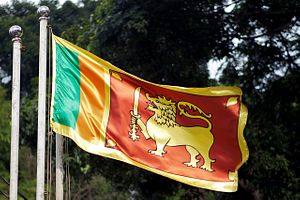Sri Lanka is experiencing a profound crisis. President Maithripala Sirisena has appointed Mahinda Rajapaksa as prime minister. The coalition government is a thing of the past. Ranil Wickremesinghe remains the legitimate prime minister and it’s not clear what happens next.
Sirisena has suspended parliament and it’s not clear when the legislative body will reconvene. It’s confusing because there’s been a lot of conflicting reporting and misinformation about changing the date. Initially, Sirisena had suspended parliament until November 16.
Thursday, reports noted that parliament would be reconvened on November 5. November 7 and then November 16 were mentioned Friday. It’s hard to tell if November 16 will be a firm date or not. It’s also worth noting that the speaker, Karu Jayasuriya, could reconvene parliament before then, but we aren’t there yet, unfortunately.
Really, Rajapaksa or Wickremesinghe should have to prove that they have majority support in the legislative body right now. Chaos and delay favor coup supporters.
It’s important to realize that, no matter what happens, Rajapaksa’s behavior is still quite unacceptable. He hasn’t earned the right to be prime minister even if he were to win a no confidence vote. And he really doesn’t even deserve a no confidence vote because his appointment was completely unconstitutional to begin with. This is an attempted coup.
Rajapaksa’s dark, authoritarian past is shaping Sri Lanka’s present.
There’s already been a bit of political violence and there could be a lot more. Of course, Rajapaksa and his supporters are already very familiar with political violence.
Rajapaksa has assumed some duties in his purported post as prime minister. He’s behaving as if he’s prime minister. With Sirisena’s help, he’s bullied his way into this position.
Rajapaksa’s supposed appointment illustrates a variety of things: that an alleged war criminal and ethnonationalist par excellence remains a powerful political force; that Sirisena has never even vaguely resembled the reformer that many claimed he might be; that Sri Lanka’s democratic gains in 2015 were a lot more tenuous than many believed; that addressing the country’s deep structural problems and issues pertaining to the civil war is probably out of the question for the foreseeable future.
However flawed, Sri Lanka has always been a democracy. There have always been peaceful transfers of power. That could be changing.
Much remains unknown and there are many reasons to be worried. On the other hand, I have noticed something significant and moving. Many brave and thoughtful Sri Lankans – from all walks of life – are speaking out. Thousands of people have already taken to the streets and more of that is sure to come.
I watched one woman on television; she was saying that people were really upset and that they weren’t going to let this illegal transfer of power happen on their watch. It was powerful.
The next few weeks are hugely important for Sri Lanka.

































